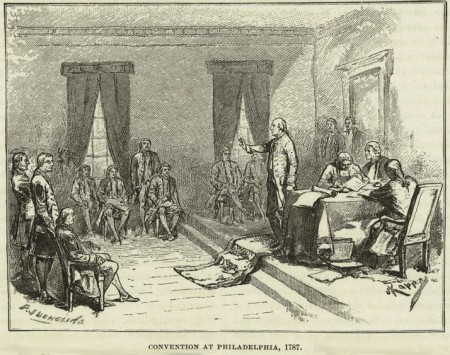When the 55 delegates gathered in Philadelphia to revise the Articles of Confederation, there were several major issues on the agenda to discuss including representation, state versus federal powers, executive power, slavery, and commerce.
Representation
Large and small states fought over representation in Congress. Large states favored representation by population, while small states argued for equal representation by State.
The "Great Compromise" allowed for both by establishing the House of Representatives, which was apportioned by populations, and the Senate which represented the states equally.
State vs. Federal Powers
A central issue at the Convention was whether the federal government or the states would have more power. Many delegates believed that the federal government should be able to overrule state laws, but others feared that a strong federal government would oppress their citizens.
The delegates compromised by allotting specific responsibilities to the federal government while delegating all other functions to the states.
Executive Power
Having fought a war against tyranny, Americans were suspicious of executive power. The Convention held no fewer than 60 votes before the delegates agreed upon the Electoral College as the method of selecting the president.
However, unspoken among the delegates was the knowledge that George Washington would become the first president, and they trusted him to define the office.
Slavery
Though the word "slavery" does not appear in the Constitution, the issue was central to the debates over commerce and representation. The "Three-Fifths Compromise" provided that three-fifths (60%) of enslaved people in each state would count toward congressional representation, which greatly increased the number of congressional seats in several states, particularly in the South.
The Convention also debated whether to allow the new federal government to ban the importation of enslaved people from outside of the United States, including directly from Africa. They ultimately agreed to allow Congress to ban it, should it choose, but not before twenty years had passed. Remarkably, it was one of the only clauses of the Constitution that could not be amended. Only in 1808 did the United States formally prohibit the international slave trade.
Commerce
Under the Articles of Confederation, the individual states competed against each other economically. They issued their own currencies and even levied taxes on each other's goods when they passed over state lines.
Delegates like Washington, Madison, and Hamilton believed that promoting the free flow of commerce across state lines and nationalizing the economy would lead to America's becoming an economic powerhouse.
How was the Constitution created?
Find OutBibliography
Richard M. Ketchum. The World of George Washington. (New York, American Heritage Publishing Company, Inc.)




